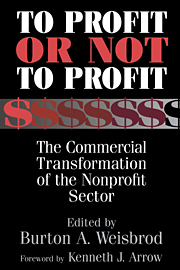Crossref Citations
This Book has been
cited by the following publications. This list is generated based on data provided by Crossref.
Corbin, John J.
1999.
A Study of Factors Influencing the Growth of Nonprofits in Social Services.
Nonprofit and Voluntary Sector Quarterly,
Vol. 28,
Issue. 3,
p.
296.
Young, Dennis R.
1999.
Nonprofit Management Studies in the United States: Current Developments and Future Prospects.
Journal of Public Affairs Education,
Vol. 5,
Issue. 1,
p.
13.
Hyde, Cheryl A.
2000.
The Hybrid Nonprofit.
Journal of Community Practice,
Vol. 8,
Issue. 4,
p.
45.
Hall, Peter Dobkin
2000.
Reviews.
Nonprofit and Voluntary Sector Quarterly,
Vol. 29,
Issue. 1,
p.
185.
Kapur, Kanika
and
Weisbrod, Burton A.
2000.
The Roles of Government and Nonprofit Suppliers in Mixed Industries.
Public Finance Review,
Vol. 28,
Issue. 4,
p.
275.
Herman, Robert D.
and
Renz, David O.
2000.
Board Practices of Especially Effective and Less Effective Local Nonprofit Organizations.
The American Review of Public Administration,
Vol. 30,
Issue. 2,
p.
146.
Brickley, James A.
and
Van Horn, R. Lawrence Lawrence
2000.
Incentives in Nonprofit Organizations: Evidence from Hospitals.
SSRN Electronic Journal ,
Zietlow, John T.
2001.
Social Entrepreneurship: Managerial, Finance and Marketing Aspects.
Journal of Nonprofit & Public Sector Marketing,
Vol. 9,
Issue. 1-2,
p.
19.
Hammack, David C.
2001.
Introduction: Growth, Transformation, and Quiet Revolution in the Nonprofit Sector Over Two Centuries.
Nonprofit and Voluntary Sector Quarterly,
Vol. 30,
Issue. 2,
p.
157.
Schmid, Hillel
2001.
NONPROFIT ORGANIZATIONS AND FOR-PROFIT ORGANIZATIONS PROVIDING HOME CARE SERVICES FOR THE ISRAELI FRAIL ELDERLY: A COMPARATIVE ANALYSIS.
International Journal of Public Administration,
Vol. 24,
Issue. 11,
p.
1233.
Brinkerhoff, Jennifer M.
and
Brinkerhoff, Derick W.
2002.
Government–nonprofit relations in comparative perspective: evolution, themes and new directions.
Public Administration and Development,
Vol. 22,
Issue. 1,
p.
3.
Brickley, James A.
and
Van Horn, R. Lawrence
2002.
Managerial Incentives in Nonprofit Organizations: Evidence from Hospitals.
The Journal of Law and Economics,
Vol. 45,
Issue. 1,
p.
227.
Bryant, Raymond L.
2002.
False Prophets? Mutant NGOs and Philippine Environmentalism.
Society & Natural Resources,
Vol. 15,
Issue. 7,
p.
629.
Glaeser, Edward L.
2002.
The Governance of Not-for-Profit Firms.
SSRN Electronic Journal,
Adams, Carolyn
2003.
The Meds and Eds in Urban Economic Development.
Journal of Urban Affairs,
Vol. 25,
Issue. 5,
p.
571.
Badelt, Christoph
2003.
The Study of the Nonprofit Enterprise.
p.
139.
Barge, J. Kevin
and
Hackett, Sandra
2003.
The intersection of cultural and professional identity in nonprofit management.
Communication Research Reports,
Vol. 20,
Issue. 1,
p.
34.
Twombly, Eric C.
2003.
Reviews.
Nonprofit and Voluntary Sector Quarterly,
Vol. 32,
Issue. 3,
p.
477.
Bode, Ingo
2003.
Flexible Response in Changing Environments: The German Third Sector Model in Transition.
Nonprofit and Voluntary Sector Quarterly,
Vol. 32,
Issue. 2,
p.
190.
Juliá, Juan F.
and
Server, Ricardo J.
2003.
Social Economy Companies in the Spanish Agricultural Sector: Delimitation and Situation in the Context of the European Union.
Annals of Public and Cooperative Economics,
Vol. 74,
Issue. 3,
p.
465.



